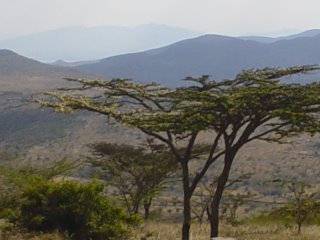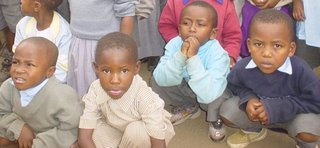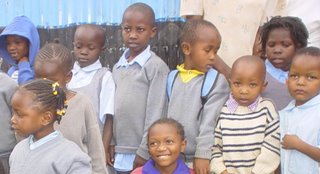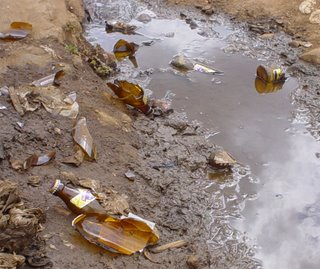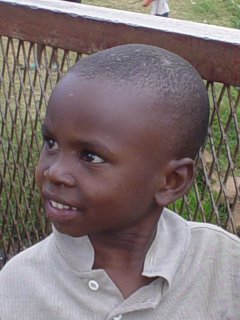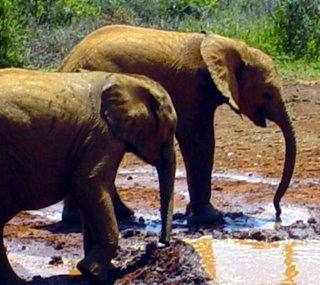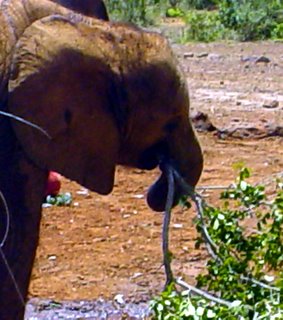Roxann came to Kenya (from Australia) three years ago to train local teachers. Early on, she got acquainted with Kobi James Muthui, who had been born with cerebral palsy. Abandoned by his mother shortly after birth, he was taken to an orphanage founded by a British missionary couple.
The following poignant account is but one story amongst hundreds of thousands that could possibly be told.
When Roxann started volunteering at the orphanage, she found herself especially attracted to 7-month old Kobi. He was a very frail and needy little boy. She often stayed late at night, rocking him to sleep before tucking him into his bed. Eventually she started taking him home on weekends. Growing very attached to him, she made an attempt to legally adopt him. Although, the Kenyan government didn’t allow the legal adoption, in essence she had become Kobi’s Mama.
Her “son” required much care and attention, but he was never a burden for her. Even as he turned three years of age, he was unable to walk or feed himself. In spite of this, Roxann had fallen in love with him. She became selflessly dedicated to meeting his every need. Her original reason for coming to Kenya eventually declined as she lovingly focused all of her attention on Kobi. He became her life, literally 24-7.
I met Roxann and Kobi two years ago at the church I attend – Karen Vineyard. Obvious to all that knew the two of them, Kobi was Roxann’s pride and joy. Her face would light up as she narrated his latest achievements. As a single woman, she had thought maybe she wouldn’t have the privilege of being a mother.
But God, in all His wisdom, had pre-ordained that these two lives would intersect. Just imagine… God brought Roxann all the way from a different continent – especially to love Kobi. It was an extraordinary connection – firmly and undoubtedly planned in His sovereignty.
Roxann sought medical advice from various sources in an untiring attempt to improve Kobi’s life. Doctors told her that he had already exceeded many expectations for a cerebral palsy victim. A few months ago, she determinedly fought through many bureaucratic hurdles and took him to Australia for surgery. Afterwards, he continued to make small improvements.
A couple weeks ago, however, Kobi’s health unexpectedly declined. He was admitted to the hospital. On Friday, August 18th, Roxann sent a text message to a good friend of hers: “My dearest Maureen, my son is now walking and jumping with his heavenly Father.”
I went to the funeral. Without a doubt, it was the most tender and intimate I’ve ever attended.
It was held at the Langata Cemetery crematorium. About fifty friends gathered to celebrate Kobi’s life. While we waited for Roxann and Kobi to arrive, a lady thoughtfully offered tissue to any that anticipated needing it. I took two pieces.
At long last, Roxann arrived. Amazingly, she herself carried little Kobi’s body. He was wrapped in a red Masaai blanket. As she walked into the open-air shelter, where we waited, a song played:
“You are my sunshine, my only sunshine. You make me happy when skies are gray. You’ll never know, dear, how much I love you. Please don’t take my sunshine away.”
Almost appropriately the skies were, in fact, heavily overcast and gray. The air was rather chilly.
As she unfalteringly walked by us, Kobi’s grieving Mama acknowledged our attendance by bravely nodding her head and smiling at us. Taking her place in a chair on the platform, she lovingly held Kobi throughout the 75-minute service. That may seem rather unusual and even a bit macabre, but I don’t believe anyone in attendance found it to be so. Personally, I found the gesture to be very personal and intimate. It demonstrated, for one last moment, the deep and lasting bond the two of them shared. During the ceremony, Roxann affectionately stroked Kobi’s face and smiled at him; she re-arranged his blanket now and then – all in a very motherly fashion. One could think he was simply taking a nap in her arms.
Two children who had also lived for a time at the orphanage – Katie and Gary – lit a candle. It stood amongst a collection of homemade cards, stuffed animals, and photographs of Kobi.
As the service got underway, we were invited to stand closer to the platform, forming a cozy semi-circle as we did so. Maureen, who had been very supportive throughout Roxann and Kobi’s two-year relationship, conducted the service. She read Matthew 18: 10, 14 –
“At that time the disciples came to Jesus, saying, ‘Who is the greatest in the Kingdom of heaven?’ And calling to Him a child, He put him in the midst of them and said, ‘Truly, I say to you, unless you turn and become like children, you will never enter the Kingdom of heaven. Whoever humbles himself like this child, he is the greatest in the Kingdom of heaven.’”
Faith, Kobi’s dedicated and tireless occupational therapist, led us in singing, “I Have a Maker”. I don’t believe there was a dry eye in the place as we tenderly sang the chorus –
“He knows my name; He knows my every thought. He sees each tear that falls and hears me when I call.”
Maureen, accompanying herself on guitar, struggled repeatedly in singing, “Fields of Grace” – about running through grassy fields. There were other heartrending readings and prayers, as well.
Mike and Michael, two young men who had served in the capacity of being “uncles” to Kobi, emotionally read a poem titled, “A Child Loaned”. When the first one could no longer hold back his tears, the other one courageously finished the recitation. I made frequent use of my tissue.
A basket of rosemary was passed around. Explaining that it symbolizes remembrance, Maureen suggested we each take some in order to not forget little Kobi. Holding my sprig to my nose, I breathed deeply of it’s tantalizing aroma.
Clive, the founder and director of the orphanage, offered a kind tribute to Roxann for her abiding love and devotion to Kobi. Margaret, who had worked with Roxann in training teachers, spoke briefly about connecting with others. She acknowledged that Roxann and Kobi’s relationship was very much a special connection. She went on to urge Roxann to not stop as she now dis-connected with Kobi. She implored her to re-connect once again with yet another needy soul.
We were each allowed to pay our last respects to Kobi and to greet and hug Roxann. A few in the crowd wept openly. One woman, overcome with emotion, had to be assisted down from the platform.
Roxann, who had freely shed several tears but had also managed to laugh off and on throughout the service, valiantly stood to make some final comments. She personally told of her relationship with Kobi and about how dearly she loved him. She thanked all of us for participating in his farewell.
Inviting them by name to join her on the platform, she particularly esteemed several of the staff at the orphanage, medical center, and hospital. Roxann acknowledged their meaningful support and encouragement to her throughout Kobi’s short life, and especially in his final days. She then dismissed them from the platform.
She reluctantly but resolutely announced that the time had arrived when she had to let go of Kobi.
As a silent yet supportive assembly, we reverently watched Roxann say her own private and final farewell to Kobi’s tiny earthly body.
For one last time, Roxann delicately and carefully wrapped the blanket around his cold body. Nobody rushed her, as we each understood the significance and poignancy of the moment.
She wept unabashedly as she held him tightly for one ultimate, lingering moment. As she gingerly placed her son in a small wicker box, she arranged everything so it was just right.
And, finally… she did let him go.
In a closing and symbolic gesture… she blew out the candle.
* * * * * *
Margaret’s comments are an indirect challenge to each one of us. There are so very many unloved and unwanted children; in Kenya alone it’s estimated that there are one million orphans!
Perhaps there’s one right in your neighborhood.
Who will you connect with and love?
Begin today.
“And the King shall answer and say unto them, ‘Verily I say unto you, inasmuch as ye have done it unto one of the least of these My brethren, ye have done it unto Me.’”
